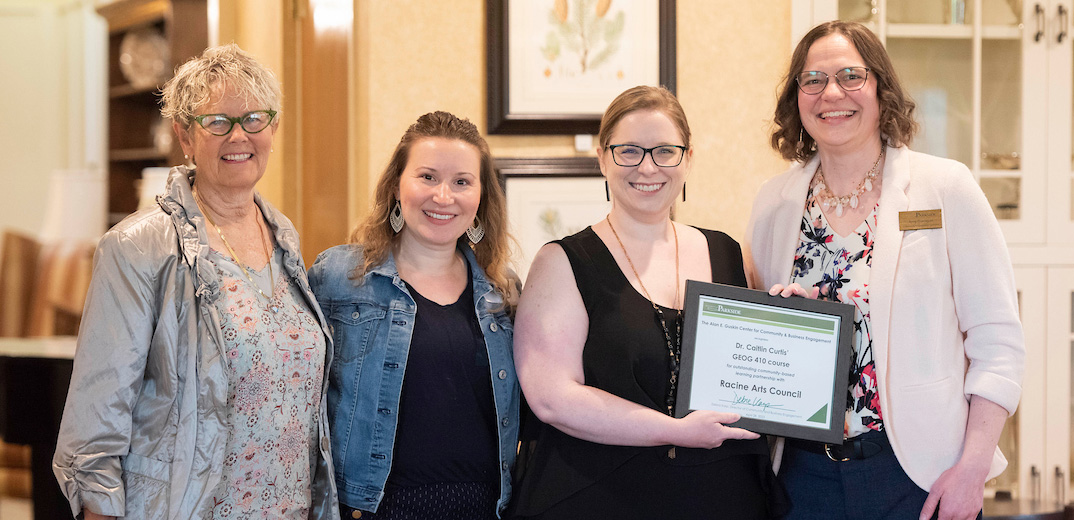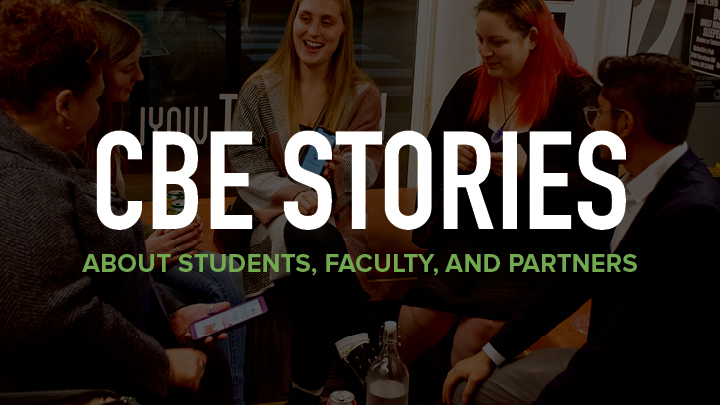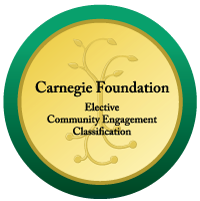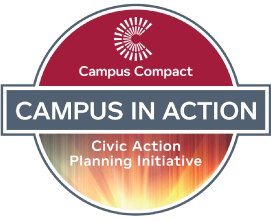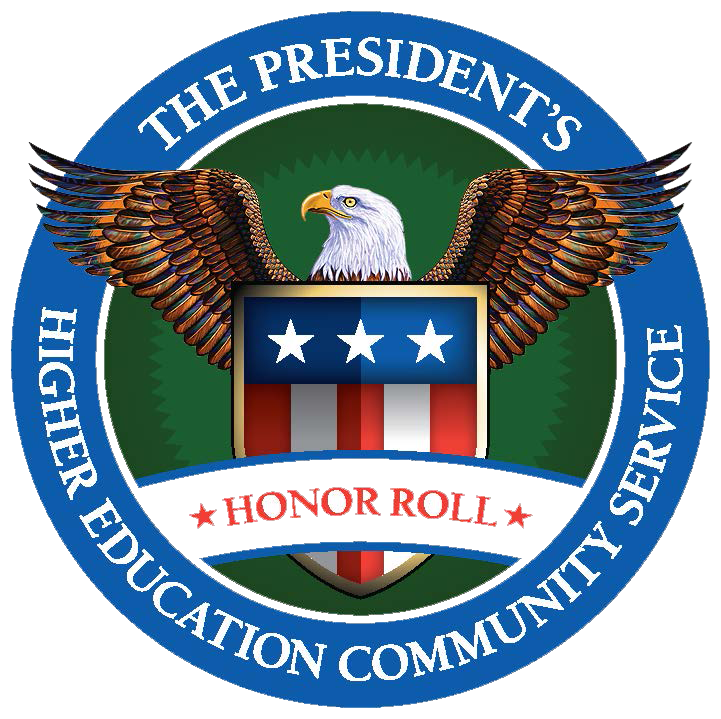Community-Based Learning
Community-based learning (CBL) is an opportunity for students to apply their knowledge and skills to real-world experiences while serving their communities. Professors and community partners work together to develop projects that allow students to enhance their classroom knowledge, develop leadership skills, network with community leaders, and meet identified community needs.
Each year, about 50 courses are matched to community organizations and about 1,000 students across majors participate.
Projects cover many professional areas, such as research, marketing plans, strategic plans, graphic design, web design, database design, security audits, GIS mapping, communication plans, personnel training, conflict resolution, and more.
Community-Based Learning is for everyone.
FOR STUDENTS – CBL INFORMATION
What is Community-Based Learning (CBL)?
How many times have you spent hours on a paper or project, only for it to be seen and graded by the instructor, and then filed away or thrown out?
With community-based learning, you do real projects that make a difference in the community. For example: instead of creating a brochure for an invented company, you produce a brochure for a local nonprofit organization that is used long after your grade is recorded. During this process, you:
- Learn how to work with a client
- Learn more about the community in which you live
- Contribute a valuable service to the community
- Add to your resume or portfolio
- Make contacts that will be valuable to your career
List of CBL Courses
Benefits of CBL
- Provides an opportunity to apply classroom learning to real life settings
-
- Enhances your understanding of subject matter
- Reinforces lectures and readings
- Connects students to each other
- Helps with problem solving
- Promotes personal growth
-
- Enhances your self esteem
- Breaks down ethnocentrism
- Develops leadership skills
- Broadens your world view
- Promotes further community involvement
- Enhances career development
-
- Helps solidify ideas of future career plans
- Builds resumes
- Develops networks
- Connects students with future job opportunities
Opportunities to be involved with Civic Engagement
Community-Based Learning Courses
Take a course that is designated as providing CBL credit
Community Engagement Certificate
Take multiple courses designated as providing CBL credit that can count towards a Certificate in Community Engagement
FOR FACULTY – CBL INFORMATION
Community-Based Learning, or academic service-learning, is a teaching and learning strategy that integrates meaningful community service with instruction and reflection to enrich the learning experience, teach civic responsibility, and strengthen communities.
The Alan E. Guskin Center for Community and Business Engagement can help you:
- Find a community partner whose needs match the learning objectives of your course
- Arrange for a community partner to come to class or meet with faculty and/or students
- Conduct training/orientation for students
- Provide templates of contracts, time sheets, etc.
- Identify resources on best practices of of CBL
- Connect you with other faculty on campus who are experienced in CBL
If you are interested in learning more about community-based learning or integrating it into your courses, contact the Community Engagement office at cblinfo@uwp.edu.
CBL Course Designation
Permanent Course Designation
A permanent CBL course designation has many benefits for both faculty and students. The permanent designation demonstrates a commitment from the academic department to include CBL as a high-impact practice in a particular course regardless of who teaches the course or the format. A permanent designation allows faculty, advisors and students to see the designation in the course catalog and plan accordingly. This is especially helpful for students if they need to take a CBL course for the Community Engagement Certificate, or if students want to avoid taking multiple CBL courses at once because of workload concerns. A permanent CBL designation also reduces the administrative burden of needing to complete one-time course designation requests every time a course is offered.
The CIM Course form is used to add a new CBL course or to add the CBL designation to an existing course. Visit the Academic Planning Resources webpage for more information on how to add new courses or change existing courses in CIM. Requests for permanent course designation are reviewed by the CBL Steering Committee and then sent to the CCC for final approval.
Note: If you are adding, changing or removing a CBL designation, you will use the same CIM Course form.
One-time Course Designation
The Miscellaneous CIM form is used to request approval for a one-time CBL designation. The one-time designation form requires the same information as the permanent course designation and will be reviewed by the CBL Steering Committee. It does not require approval by CCC and the course will not be designated as CBL in the course catalog.
- Select the Propose New Miscellaneous button.
- After the form opens, select from the request type drop down – One-time CBL designation
- Once the form is completed, select the START WORKFLOW button at the bottom of the page.
If you have questions about required information, please contact Amy Garrigan at garrigan@uwp.edu.
Faculty Resources
- CBL Learning Goals (revised 2023)
- Institutional Review Board (IRB) Guidelines for CBL
- Liability and CBL
- Guskin Center Reflection Guide
- Campus Compact sample syllabi
- Partner agreement form template
- Field trip form
- UW-Parkside Library CBL Resources
- Campus Compact
- SENCR – Science Education for New Civic Engagements and Responsibilities
- Michigan Journal of Service Learning
- International Association on Service-Learning and Community Engagement
- Journal of Higher Education Outreach and Engagement
- Community Engaged Teaching and Learning Conferences and Journals
Local community information
- United Way of Wisconsin’s ALICE reports (ALICE = Asset Limited, Income Constrained, Employed)
- Kenosha County Community Resources Agency Directory
- Racine County Community Resources Agency Directory
Guidelines for Student Reflection
Reflection is a key component of community-based learning that guides students to examine critical issues related to their civic engagement. Reflection asks the following questions:
- What?
-
- What did I do and observe?
- What issue am I addressing?
- So what?
-
- What impact is my experience having on me?
- What did I do that was effective and why?
- What was not effective and how might I improve on this?
- What have I learned about myself?
- Now what?
-
- What commitment am I making to my community as a result of this project?
- What other projects might I seek out that offer civic engagement?
Additional reflection prompts can be found in the Guskin Center Reflection Guide.
FOR COMMUNITY – CBL INFORMATION
Community-based learning projects match faculty and students to the needs of the nonprofit, government, and business community.
WHY PARTNER WITH UW-PARKSIDE
- Fill a need in your organization
- Connect with experts at the university
- Expose students to your mission
- Recruit future long-term volunteers
Sample projects include research, marketing plans, strategic plans, graphic design, web page design, database design, security audits, GIS mapping, communication plans, personnel training, conflict resolution, applied health sciences, and more.
Organizations interested in working with a Community-Based Learning project should contact. Amy Garrigan garrigan@uwp.edu or (262) 595-2312 at the Alan E. Guskin Center for Community and Business Engagement.
Community Engagement Certificate
Designated CBL courses can be applied toward the Community Engagement Certificate. The CE certificate is a 13-credit/five-course certificate that promotes student understanding of community needs, facilitates networking opportunities, and looks great on a resume whether applying for future employment or graduate school. You'll start with an intro course, select CBL elective courses, then top it off with a capstone.
LEARN MORE: Community Engagement Certificate CBL Courses CBL Projects and News
SHARE YOUR LEARNING IN ACTION EXPERIENCE
Thousands of Parkside students put their learning in action every year, and we want to hear your stories! Fill out the survey to share a testimonial about your internship, campus job, community-based learning, study abroad, or undergraduate research experience, and we may feature you in upcoming Learning in Action promotion.
CONTACT INFORMATION
Amy Garrigan | 262-595-2312 | garrigan@uwp.edu
